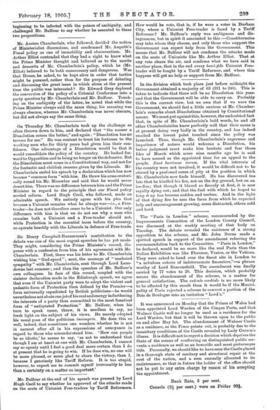Mr. Austen Chamberlain, who followed, derided the notion of Ministerialist
dissensions, and condemned Mr. Asquith's Fiscal policy as one of immobility and obscurantism. Mr. Arthur Elliot contended that they had a right to know what the Prime Minister thought and believed as to the merits and demerits of Mr. Chamberlain's policy, which he (Mr. Elliot) believed to be both unnecessary and dangerous. Was that House, he asked, to be kept alive in order that tactics might be pursued, rather than for the purpose of debating and discussing the great issue in which alone at the present time the public was interested ? Sir Edward Grey deplored the conversion of the policy of a Colonial Conference into a party question by Mr. Chamberlain and Mr. Balfour. Touch- ing on the ambiguity of the latter, he noted that while the Prime Minister always said the same thing, his meaning was always obscure, whereas Mr. Chamberlain was never obscure, but did not always say the same thing.






































 Previous page
Previous page